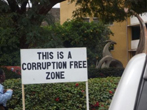Stop 'mutilation' of Kenya's constitution

As the Kenya Parliamentary Select Committee conducts its review of a revised draft of the country’s constitution, Yash Ghai reminds the committee that its role is to ‘resolve contentious issues’ in the document, not to determine them.
The Kenya Parliamentary Select Committee (PSC) has started its review of the revised harmonised draft (RHDC), with gusto, by slashing some valuable provisions. One member said, even before the PSC had received the RHDC, that it intended to ‘mutilate’ the draft. Perhaps in its enthusiasm, the PSC forgot the limits of its mandate. The mandate is to resolve contentious issues. What are contentious issues is to be determined by the Committee of Experts (CoE), which identified three – the executive, devolution and transitional measures, after requisite consultation with the public. These had become contentious primarily because of differences among politicians and it was considered (incorrectly in my view) that consensus among politicians was necessary to resolve them. The PSC cannot re-open other provisions in the RHDC. The provisions that the PSC has already deleted, and some others that seem to be doomed, have appeared in the Constitution of Kenya Review Commission (CKRC) draft, Bomas, Wako draft and the CoE drafts, with the endorsement of Kenyans.
An issue does not become contentious merely because a majority of the 27 members of the PSC does not like it. As it seems, they do not like human rights, such as the equal rights of women with men in marriage. Nor do they like gay marriages, and even though the RHDC explicitly prohibits gay marriages, the PSC has removed the general right to found a family (enshrined in the Universal Declaration of Human Rights, and sanctified by all major religions) lest it become the backdoor to gay marriages. Pray how? These legislators must explain how any reasonable person could reach this conclusion.
Nor does the PSC like socio-economic rights, such as access to clear water, health, education, food and shelter. They say such rights are not enforceable –despite considerable evidence to the contrary. South Africa, Ireland, India and several Latin American states have enforced these rights without any jurisprudential difficulties – and despite the very careful and circumspect manner in which the RHDC has framed them. MPs who regularly, almost ritualistically vote themselves huge annual increases in salary and perks, have the audacity to withhold from millions of Kenyans the basic material needs without which they can experience little of human dignity.
The PSC is reported to have removed the Human Rights and Gender Commission, and weakened the procedure for the enforcement of rights (while using the lack of enforcement as an excuse to delete rights). It is well known that some key members of the PSC have reason to detest the integrity and fearlessness with which the National Human Rights Commission has discharged its onerous tasks. Indeed some of them have gone to court to ‘nullify’ some of its findings inconvenient to them. Its funding has also been slashed in order to intimidate it. To say that there is already legislation on the commission is disingenuous, for they well know that without constitutional protection, it can be ‘mutilated’ or even removed altogether.
The diminution of the value and status of rights is a serious indictment of the PSC. Accompanying this is its contempt for civil society, and the people in general. Provisions guaranteeing the role of civil society in political and state affairs have been deleted. They forget that but for the struggles for human rights and democracy that civil society waged, at great personal cost to its activists, we might still be in the dark age of one-party oppression. Procedures for participation of the people in law making – common in numerous countries – have also been removed, by people who claim the mandate of the people as they go about their hatchet job.
Some of these deletions are justified on the ground that the draft is too long. What is the problem with a lengthy constitution? Undoubtedly redundancy or excessive detail should be avoided. But as we build trust in state institutions; fight the campaign to eradicate corruption; balance national identity with ethnic and religious identities; establish public accountability; ensure fairness in administration and provide an effective framework for the protection of our environment the creation of institutions of democracy, the question of length is banal, and an evasion of the responsibilities of constitution makers.
Kenyans have long been fearful as to what would happen when the draft goes to politicians. Through the years when they struggled for the reform of our political and state, politicians stood in their way, even before the days of the Inter-Parties Parliamentary Group (IPPG). They are afraid that we are now once again witnessing the hijacking of reform, after all the efforts and commitment of the people. Politicians need to be reminded that they have no special purchase on the constitution making process. The constitution belongs to the people; it expresses their sovereignty. The PSC must stop this mutilation. Let people not have to choose between the current constitution that has served us poorly and a newly fashioned draft, from which all humanistic considerations have been deleted, in the interests of the privileged classes.
BROUGHT TO YOU BY PAMBAZUKA NEWS
* Yash Ghai is a professor of constitutional law. He is the head of the Constitution Advisory Support Unit of the United Nations Development Programme in Nepal and a special representative of the UN secretary general in Cambodia on human rights.
* Please send comments to [email protected] or comment online at Pambazuka News.

